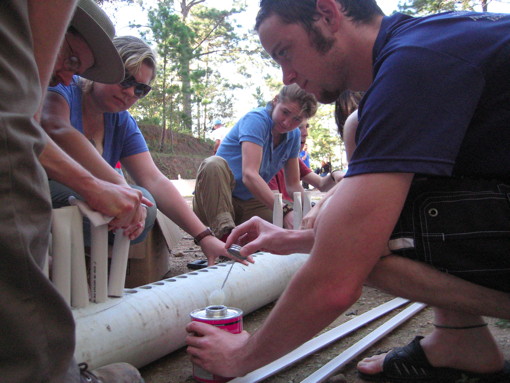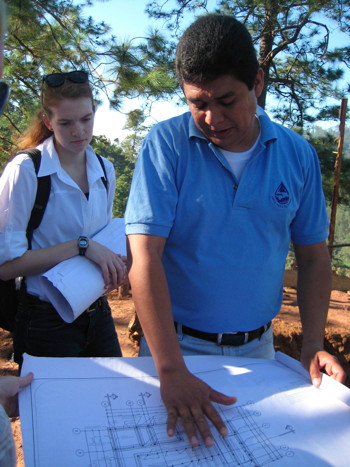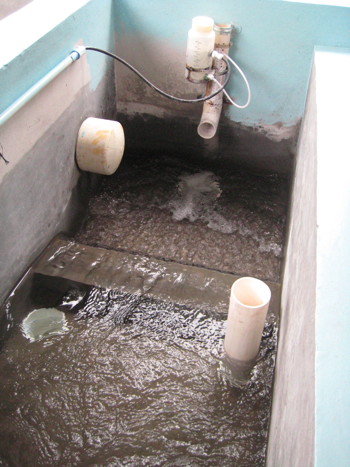GLOBAL
Celebrating clean water in Honduras

AguaClara students visiting Honduras Jan. 6-20 toured existing water plants and helped improve others, including one in Marcala, where they installed a new inlet manifold. From left, AguaClara faculty leader Monroe Weber-Shirk; Jordanna Kendrot, M.Eng. '12; Breann Liebermann '14; and Patrick Farnham, M.Eng. '11.
Tamara, Honduras – It was a full-blown fiesta, complete with a mariachi band, platters of food and boisterous children. No one who takes clean, drinkable tap water for granted could possibly have guessed the reason for the Jan. 13 party – the "inauguration" of a water filter designed by Cornell engineering students.
The stacked rapid sand filter, developed by members of Cornell's AguaClara research team, could well be the reason that Tamara, a working-class town of about 3,500, now has some of the best water in all of Honduras.
AguaClara team members, spending two weeks in Honduras, got to celebrate in person. Attending the filter inauguration was a highlight of the team's Jan. 6-20 journey through the country, accompanied by their leader, civil and environmental engineering senior lecturer Monroe Weber-Shirk.
It was the seventh annual AguaClara trip; Weber-Shirk considers it an integral part of the students' work and research. They get to see the brick-and-mortar plants, interact with the engineers and operators who build and run them, and meet the people whose lives have been changed by having clean water for the first time.

Annie Newcomb '13 listens to Agua Para el Pueblo engineer Santiago Garcia describe the Atima construction site to AguaClara students visiting Honduras. See larger image
Among their other stops this year was AguaClara's eighth and newest plant, in Atima, which is now under construction, as well as potential sites for future plants.
The sand filter is the latest chapter in Tamara's story of clean water, which began four years ago when the town's local water board laid the first stone of a much-anticipated AguaClara water treatment plant. The Cornell team designs water treatment technologies in partnership with the Honduran nonprofit organization Agua Para el Pueblo (APP), which supplies technical expertise and education to municipalities about clean water.
The stacked rapid sand filter's design team included Mickey Adelman, M.S. '12, who lived in Honduras this past summer to help oversee construction and implement it, along with Anderson Cordero '10, M.Eng. '11, and Jeff Will '10, M.Eng. '11, who is a Fulbright scholar and AguaClara engineer stationed in Honduras.
The filter is truly like no other, Weber-Shirk said: "Slow sand filters were first used in 1829. Rapid sand filters were invented around 1890. Stacked rapid sand filters were invented by Cornell in 2010."

Finished water is chlorinated and sent to distribution tanks at the AguaClara plant in Tamara, Honduras. See larger image
Adelman and Will explained that the filter works like filters in the U.S. but with an innovative geometry. It is essentially six mini filters stacked on top of each other, whereas conventional filters typically consist of only one sand bed. The stacking allows for sufficient velocities during backwash, which is a process to clean the contaminants that collect in the filter every day – without the use of pumps.
Tamara is now producing water that exceeds World Health Organization standards. On Jan. 12, it was producing water at 0.5 NTU, which is a universal measure of the water's turbidity, or clarity; the World Health Organization's standard is 1.
The water is so pure that as soon as AguaClara students arrived in Tamara, they began filling their water bottles straight from the tap.
Video: http://www.cornell.edu/video/?videoID=1877